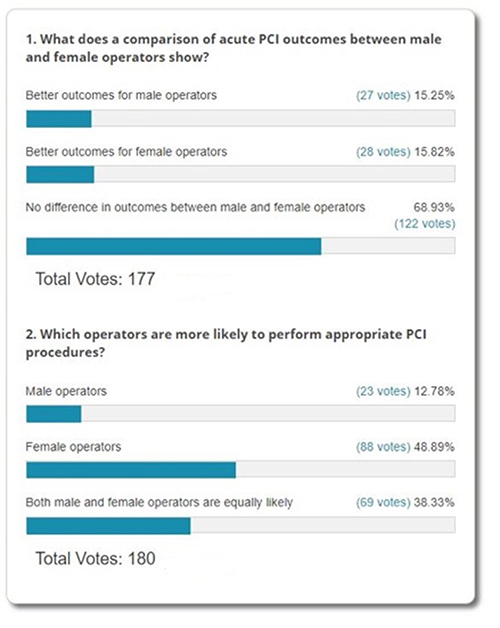Poll Results: Interventional "Battle of the Sexes": Who Gets Better Results?
Key Points
- Male and female PCI operators in a recent study had similar clinical outcomes.
- Women tended to slightly more frequently adhere to appropriate use criteria and guideline medical management compared to men.
A recent Poll addressed the question of outcomes for female vs. male interventionalists. The results are below. Responders (69%) felt that females would have better outcomes, while there was no consensus as to as to which operator sex was more likely to perform PCI for "appropriate" indications. Female operators were chosen 49% for appropriateness vs. 13% for male operators and 38% picked no difference.
These poll results were close to those from a recent study1 which analyzed PCI outcomes by operator sex from 48 hospitals in Michigan between 2010-2017 inclusive. Logistic regression was used to adjust for baseline patient differences between male and female operators. There were 18 female operators performing 6362 procedures (2.7%) and 385 male operators performing 239,420 procedures. There were no differences in the incidence of mortality, acute kidney injury, transfusion, or bleeding between operator groups. However, there was a small, but significant difference (86.64% vs. 84.45%, p=0.0001) in likelihood that female interventionalists performed guideline appropriate PCIs. Furthermore, female interventionalists were also more likely to use guideline directed treatment.

References
- Yelavarthy P, Seth M, Pielsticker E, et al. The DISCO study—Does Interventionalists' Sex impact Coronary Outcomes? Catheter Cardiovasc Interv 2021;1–9.
Clinical Topics: Invasive Cardiovascular Angiography and Intervention
Keywords: Percutaneous Coronary Intervention, Female, Male, Incidence, Acute Kidney Injury
< Back to Listings

